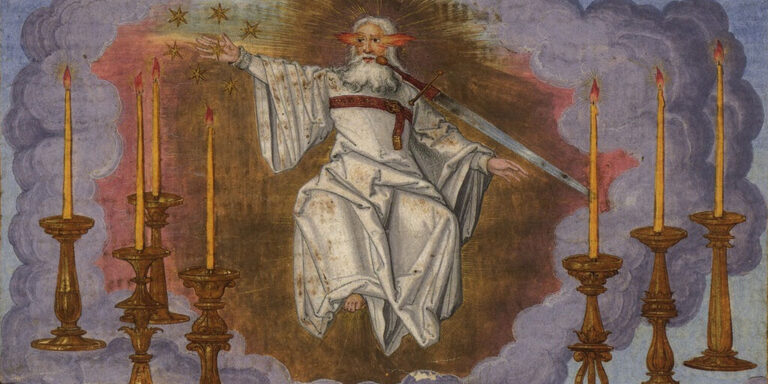Revelation: Removing the Veil
This revelation was given by God to the Apostle John because we needed to know it.
Part 1
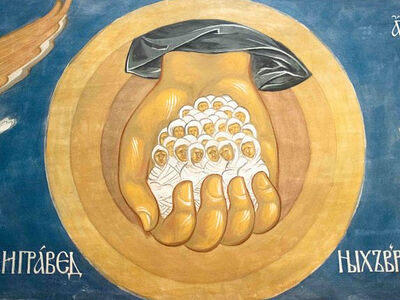
If Christ Is With Us, Death Is Defeated
The book of Revelation teaches us a lot, especially when we begin to carefully delve into its words, when we see how Christ holds the world in His hands and acts with wisdom in all things.
Part 2
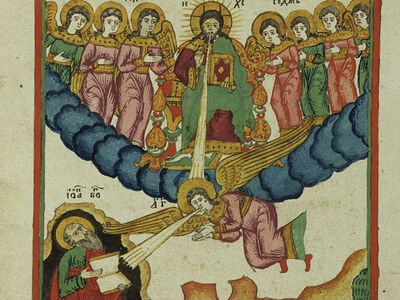
Why Did the Lord Leave Man the Book of Revelation?
Only the people of God, the saints, can receive revelations from God, and only they can interpret them, because a revelation, words from God, is given from God, from the Holy Spirit.
Part 3
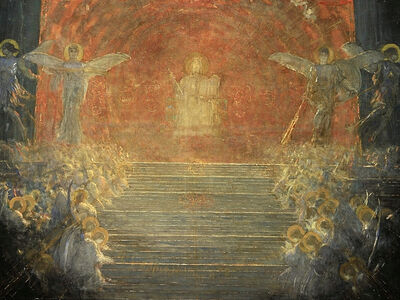
For the Time Is at Hand…
We have to understand that God acts outside of time, and the events of Revelation don’t relate only to the end times.
Part 4
Blessed is he that readeth, and they that hear the words of this prophecy
We stopped on the fourth verse of the first chapter. Last time, we talked about it as the Revelation of Jesus Christ, which God gave unto Him, to shew unto His servants things which must shortly come to pass (Rev. 1:1). I repeat that it was written because it will happen this way—it’s not that it will happen this way because it was foretold. All of this is going to happen, thus a prophecy about it was recorded. If we say the opposite, it will seem that God is to blame for all this evil. It was revealed that all these terrible events will come to pass, arranged by people themselves, and they will be responsible for what happens. God knows about it, thus a prophecy was recorded.
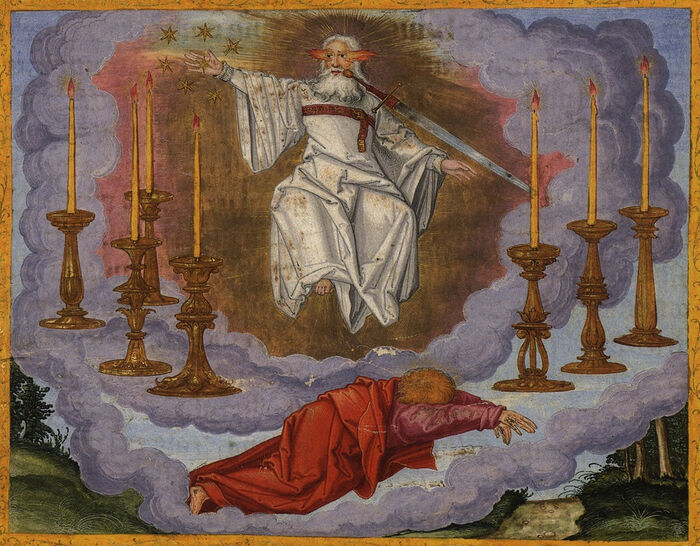
Matthias Gerung, St. John’s Vision of the Seven Lampstands 15th c.
Christ sent the revelation through an angel to His servant the Apostle and Evangelist John, who conveyed the word of God and the testimony of Jesus Christ about what he saw and heard. Blessed is he that readeth, and they that hear the words of this prophecy, and keep those things which are written therein: for the time is at hand (Rev. 1:3). We spoke about how the time is at hand—it’s not in our time dimension, because God is beyond the bounds of our human time and moves in His Divine dimension.
Let’s move on to the fourth verse, where, after the introduction, the Apostle John begins to speak. John to the seven churches which are in Asia: Grace be unto you, and peace, from Him Which is, and Which was, and Which is to come; and from the seven Spirits which are before His throne (Rev. 1:4). These are the churches that were located in Asia Minor. There were other churches then, located in various places. These seven churches, seven spirits, seven eyes—we’ll constantly see this number seven—have a symbolic meaning, which is fullness, like the seven days of creation. This means the words of this prophecy are addressed to the entire Church in all ages. The Apostle John says that he prays that God will grant His grace and peace; God Which is, and Which was, and Which is to come.
And then you’ll notice, especially philologists, that he changes the order of words. Instead of saying, “who was, who is, and who is coming,” the Apostle changes the order, although he knew Greek very well, and says: Which is, and Which was, and Which is to come, referring to God. The Apostle prays that grace and peace from God might descend upon Christians.
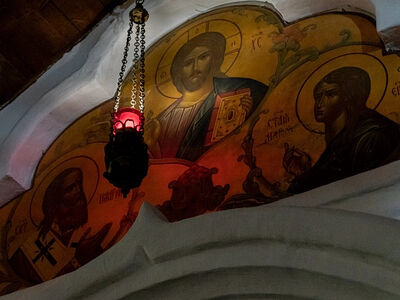
On God’s Grace and Free Will
Thus, Christ is the Prince of life, the Source of Life, the Captain of life, the Guide, the Leader of salvation.
Grace is the deliverance that God gave the world. When we in the Church say “grace,” we understand this word to mean energy, the uncreated energy of God, which is poured out on man and saves him. Man is delivered by the grace of God—we can interpret it this way. Man is liberated for free. Our salvation was given to us for free; we didn’t offer anything. Christ saved us gratuitously. And may this grace of our deliverance, and the energy of the Holy Spirit, and the peace of God be with us all.
Peace is a consequence of the coming of grace. When grace abides in a man, that man becomes peaceful. There’s no peace without grace. Wherever you see confusion, irritation, shouting, screaming, nerves, disorder, there’s no grace there. Grace can’t abide where there’s no peace. God makes His abode in a peaceful man. God doesn’t dwell in an anxious, restless, angry, nervous, gloomy, and confused man. God is the God of peace and He dwells in peace.
God reveals Himself through peace and those who have peace within them. Grace first manifests as peace, as Christ often said, “Peace be unto you.” When we encounter God, we feel peace. In His absence, we feel inner turmoil. Where there is confusion and dismay, God is not present. The Apostle reminds us of the Triunity of God, from the Old Testament to the New Testament. The name of God, “I AM THAT I AM,” signifies His existence. The translation of this name as “the Being, He Who Is” emphasizes His eternal nature. The Apostle John, using the translation of the seventy, reinforces the continuity of God from the Old Testament to the New Testament. The reference to “Him Which is, and Which was, and Which is to come” reflects the Triunity of God. The mention of the seven Spirits before His throne denotes the fullness of the gifts of the Holy Spirit. This passage clearly points to the Holy Trinity: God the Father, the Holy Spirit, and Jesus Christ. Is this an unwinnable situation?
The Jehovah’s Witnesses claim that the Holy Trinity is not mentioned in Scripture, but there are numerous references to the Holy Trinity that provide assurance to the Church. In Revelation 1:5, it is stated that Jesus Christ is the faithful witness, the first begotten of the dead, and the Prince of the kings of the earth. This passage reveals the truth about God, the Holy Trinity, and the salvation of man through Christ. It emphasizes the belief of the Church in the resurrection of all the dead.
The idea of reincarnation contradicts the concept of resurrection, as it raises questions about which body individuals would be resurrected in and challenges the uniqueness of human personality. The Orthodox Church rejects the theory of transmigration of souls and upholds the belief in the resurrection from the dead through Jesus Christ, who is above all and cleanses us from our sins with His Blood.
When we partake in the Divine Liturgy, we receive the Body and Blood of Christ for the remission of sins and eternal life. Through communion with Christ, we participate in our personal salvation and cleansing from sin. Christ’s sacrifice on the cross saved all of mankind, and by partaking in the Sacrament, we are cleansed and purified.
To be continued…
Source link

